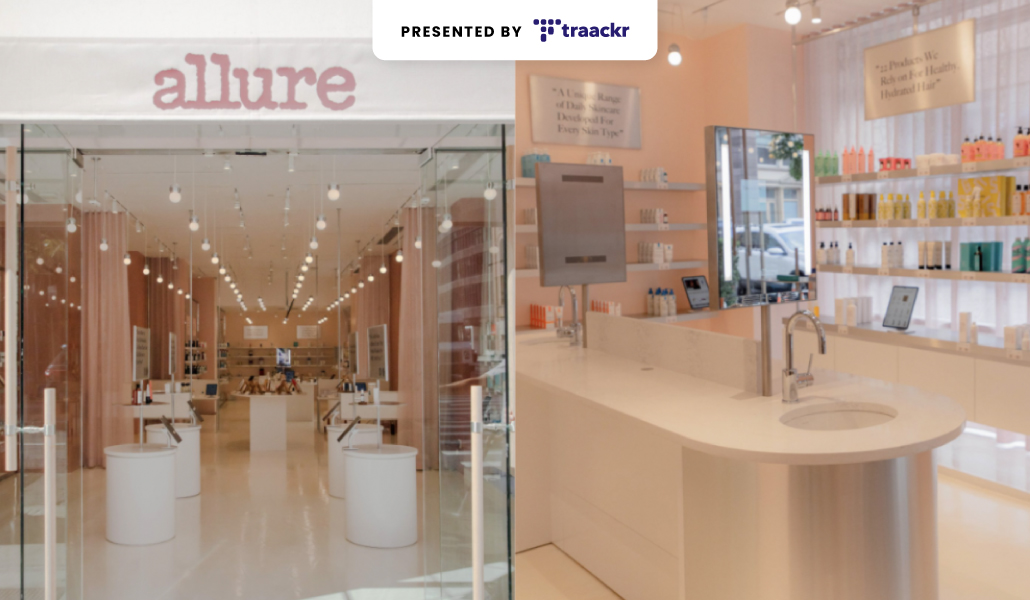Last week, I paid a visit to the Allure store in NYC. It was a day after the store’s official opening, for which a number of influencers had been invited, and a week after the “soft launch,” when most press announcements for the store went live.
Arriving right when it opened at 11 a.m., the store was quiet, and I got a couple of minutes to roam around alone, taking snapshots of the brands displayed — which range from heavy hitters like Tatcha and Charlotte Tilbury to newcomers like Meloway, which makes mascara, and Naturally Drenched, a clean hair care line for natural curls. The salespeople wore beige jumpsuits, made specifically for the store by NYC brand Still Here NY. Days prior, there’d been discussion on an Estée Laundry post regarding the pink jumpsuits worn by associates in the first images of the store, and whether or not those were “owned” by Glossier.
While, traditionally, beauty stores are merchandised by brand or, in some more recent cases, category (i.e., cleanser, moisturizer, etc.), the Allure store is organized by headlines, displayed above the products, and meant to mock those in magazines. Some have actually served as headlines for stories on Allure’s website. Examples include “The Perfect Makeup Routine To Glow (Not Glisten) All Summer Long.” That shelf includes products like Ilia’s popular Super Serum Skin Tint and Emilie Heathe nail polish. The “Here’s How to Get Soft, Dewy Skin All Year Long” section features Lord Jones’ CBD-infused Royal Oil, Murad’s Retinol Youth Renewal Serum and products from lesser-known brands, like Celepiderme’s Multivitamin Ampoule and high-end indie brand Monastery’s Flora Botanical Cream Serum. A wall titled “A Unique Range of Daily Skincare Developed For Every Skin Type” solely features products from French pharmacy mainstay La Roche-Posay. A small table with a sign reading “Michelle Pfeiffer Wants Your Life to Smell Like Henry Rose” features four of the actor’s perfumes. Editor-in-chief Michelle Lee (who is leaving the magazine after six years at the end of the month) wrote most of the headlines.

Every featured product has been featured in Allure’s pages or on its digital site. Still, to formally secure its place on the store’s shelves, each brand paid a fee, according to industry insiders and confirmed by Condé Nast. Of course, a dedicated section — like that of La Roche-Posay or Henry Rose — no doubt cost more than inclusion on one of the more editorialized walls. A brand’s financial investment in the store also “enables access to a number of perks, including using the store as a venue, access to data analytics, sales profits, and influencer and press awareness,” said Sonny Gindi, creative director and co-founder of retail platform Stour, which was hired by Condé Nast to translate Allure’s online content to the retail space. He did not comment on pricing. To that end, there are about 190 events currently slated, with upward of four per day, over the next three months. Over the weekend, Deepica Mutyala, influencer and founder of beauty brand Live Tinted, hosted a masterclass that drew a line outside the Soho store.
On the day I was there, the store filled up. Being the second day, a number of the guests worked for the brands displayed. I talked to three women who work for Church & Dwight, the parent company of the iconic Batiste dry shampoo, an Allure Best of Beauty winner. I asked those not affiliated with brands what brought them into the store. One woman, a highly respected novelist who asked not to be named, said she often comes across and consults Allure articles when she shops for beauty. Another young woman, dressed casually in a T-shirt and shorts, said she frequently buys products from “cruelty-free brands or the drugstore.” Her observations of the store were that it was “spacious, bright and smelled really clean.”
I also spoke to a mother and her two daughters, ages 15 and 17, who were visiting from Chicago. One of the daughters had learned about the store on an influencer’s TikTok, though she couldn’t recall which influencer. The mother was buying both of the teens Patchology’s Breakout Box, and she purchased Charlotte Tilbury’s Pillow Talk lipstick for herself. She scanned the QR codes located alongside every product and checked out via her phone. On the lower level, staffers were collecting the purchased products and delivering them to the shoppers.

One of the hallmarks of the store is its technology. Tablets abound and every product has a QR code, something that feels more familiar in the post-Covid world than before. Personally, I found this most useful for fragrances. As I spritzed each Henry Rose scent onto a blotter, I pulled up a web page telling me the notes I was smelling. The links available by way of the QR codes also included the brand’s social media accounts and Allure content featuring the product.
The Allure store creates a world in which Allure is the queen bee beauty influencer, but any normal customer can be a content creator in her (or his) own right, thanks to smart mirrors set up to film tutorials and snap selfies. The store has its own social media channels (@theallurestore on Instagram) and worked with a handful of influencers (like @strollersinthecity, 190,000 followers) to create paid content promoting its opening. #allurestore has about 49,000 views on TikTok.
View this post on Instagram
Allure has said its goal is to bring new people into the brand’s universe, which in 2021, exceeds just a magazine. It has two podcasts, a subscription box of products and, of course, social platforms. If shoppers help expand that universe with UGC-generated content, it seems Allure will have won.
The Allure Store is open now at 191 Lafayette Street from 11 a.m.-7 p.m.




